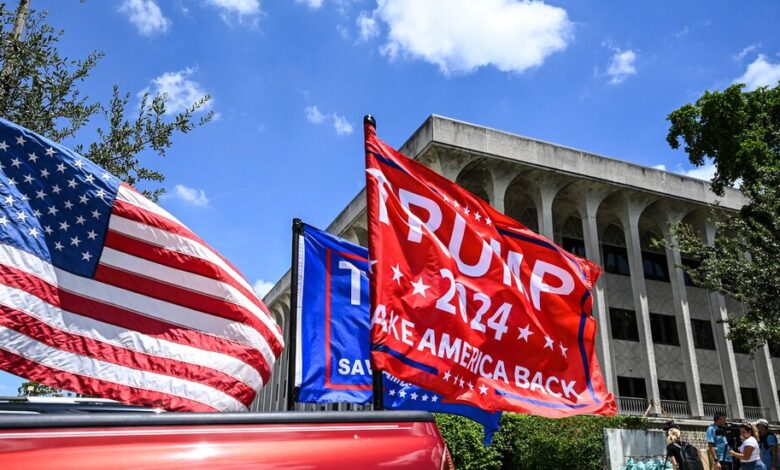A Defense of G.O.P. Paranoia

The reaction to the F.B.I. search of Donald Trump’s Mar-a-Lago property created an immediate and furious backlash among Republicans. Even after two years of making political hay out of left-wing calls to defund the police, voices on the right are calling for abolishing the federal law enforcement agency. Stoked by Mr. Trump’s characteristic demagogy, his supporters immediately leaped to the worst and most dire possibilities without pausing to get the facts, and targeted the F.B.I. as an institution.
This has led to mockery of the G.O.P. for being only selectively pro law enforcement. The rhetoric has been over the top — often outlandishly so — and we aren’t going to eliminate the F.B.I. and its investigations of terrorists, drug gangs, foreign agents and all other manner of crime.
It’s impossible to understand the G.O.P. reaction to the raid, though, without accounting for the context of the Russia investigation of Mr. Trump’s 2016 campaign that consumed the first two years of his presidency. If the shoe were on the other foot, and a high-profile Democrat were similarly targeted, the left would be just as suspicious of the authorities and defensive of the target as the right has been.
It’s part of our national character to have a deeply ingrained distrust of political power, and especially executive power, which is why both sides in our political divide have suspected the other of plotting to establish a dictatorship going back to the Federalists and the Democratic-Republicans in the 1790s.
This means that investigations of prominent figures of one party carried out by officials of the other party aren’t going to be met by a relaxed attitude and sympathetic understanding.
George W. Bush is now widely considered a relatively benign figure from a bygone, pre-Trump era. It’s worth remembering, though, that his presidency was viewed through the most hostile and paranoid lens as the advent of an American authoritarianism under the guise of the war on terror.
If Mr. Bush’s Justice Department had searched the offices of Vice President Al Gore or Senator John Kerry, the reaction on the center-left presumably wouldn’t have been, “Let’s wait and see — maybe the F.B.I. agents who conducted the search turned up some really damaging material and they obtained a warrant from a judge, so what possibly could be amiss?”
The last time there was a significant investigation of a Democratic president, Bill Clinton, Democrats waged all-out war on the prosecutor. The independent counsel, Ken Starr, had a Republican background, but he wasn’t working for a G.O.P. administration. He was appointed by a three-judge panel after Mr. Clinton’s own attorney general, Janet Reno, triggered the investigation.
Independent-counsel investigations tend to run out of control, and Democrats were understandably horrified that a probe into a land deal, Whitewater, morphed into an investigation into a cover-up of a sex scandal, the Monica Lewinsky affair. Still, Mr. Starr and his investigators were portrayed as sex-obsessed McCarthyites using Gestapo tactics to try to force a president from office.
A major element of the Democratic pushback was a conspiracy theory — not a loose suggestion of a conspiracy, but the repeated, explicit invocation of “a vast right-wing conspiracy,” in Hillary Clinton’s famous words.
When Mrs. Clinton’s bespoke email server as secretary of state came under F.B.I. scrutiny beginning in 2015, the reaction by her own party was equally harsh. The probe was said to be disproportionate at best, and even sexist. When James Comey publicly disclosed that the agency was looking into newly discovered emails near the end of the campaign, the Clinton campaign launched “a ferocious attack on the F.B.I.’s director,” as The New York Times reported at the time.
The Democrats had good cause to complain about how Mr. Comey violated F.B.I. guidelines in repeatedly commenting on the Clinton case. What they don’t appreciate is how Mr. Comey went from Democratic villain with his dubious handling of the email investigation to Democratic hero with his dubious handling of the Russia investigation.
The Russia investigation was a national fiasco that brought discredit on the F.B.I. and everyone who participated in it. The probe prominently featured a transparently ridiculous dossier generated by the Clinton campaign, eventually spinning into a special-counsel investigation that became, to some significant extent, about itself and whether Mr. Trump was guilty of obstruction. People who should have known better got caught up in the feeding frenzy and speculated that “the walls were closing in” on Mr. Trump, or that he might have been a Russian asset going back decades.
It all came to naught with almost no one expressing any regret about the unnecessary, yearslong psychodrama. It would be better if more people acknowledged — life being complicated — that even someone you hate and fear can be treated unfairly.
That experience guarantees that no Republican is going to take assurances about the Mar-a-Lago search, or any other Trump investigation, at face value.
Pointing to similar conduct over the years by Mr. Trump’s adversaries needn’t be an exercise in explaining away Mr. Trump’s excesses and lapses, but it can be useful as a means of establishing a baseline for how political parties naturally react in such circumstances, and a caution against heedlessly causing a political conflagration with unpredictable and possibly dire consequences.
Contrary to what the left might tell itself, it is not only Republicans foolishly beholden to Mr. Trump who could possibly go ballistic over a politically sensitive law-enforcement action.
All of the criminal investigations of Mr. Trump and his associates, whether related to Jan. 6, his handling of classified material, the Georgia electors or the Trump organization, are being handled by partisan Democrats at the federal or local level who have every incentive to nail him to the wall. This isn’t a formula for legitimacy. Attorney General Merrick Garland, in particular, has been the subject of an open, intense political pressure campaign to get him to move against Mr. Trump.
Another obstacle to the widespread acceptance of a potential indictment of Mr. Trump for Jan. 6 is that, absent smoking-gun evidence we aren’t aware of, it will be far from a clear-cut case. Mr. Trump did not shoot someone on Fifth Avenue, with the ballistics and witnesses all establishing beyond a doubt that he is guilty of a frequently and properly prosecuted crime. He engaged in a political offense against our constitutional system that criminal statues are ill-suited to address, no matter how infamous the conduct. An indictment on the grounds that he obstructed Congress or defrauded the U.S. government will depend on novel interpretations of the law and present entirely new legal questions that, at best for the prosecution, will take years to settle and, at worst, ultimately lead to a collapse of the case.
A case inherently fraught with politics is the worst testing ground for novel legal arguments and will only heighten suspicions that the law is being twisted into a political tool.
If it is too difficult now for Democrats to imagine how they might react to such a prosecution of one of their own, they might have a clearer sense soon enough. An indictment of Mr. Trump would invite retaliation and if Republicans retake the White House, a motivated G.O.P.-controlled Justice Department could be expected to aggressively pursue a reason to indict Joe Biden over his son Hunter’s business dealings.
In the tumult over a Trump indictment, both sides will accuse the other of violating the country’s norms and traditions. But there’s no doubt that a fierce Republican response, deeply distrustful of the authorities and openly defiant, would be profoundly American.
Mr. Lowry is the editor in chief of National Review.
The Times is committed to publishing a diversity of letters to the editor. We’d like to hear what you think about this or any of our articles. Here are some tips. And here’s our email: [email protected].
Follow The New York Times Opinion section on Facebook, Twitter (@NYTopinion) and Instagram.



